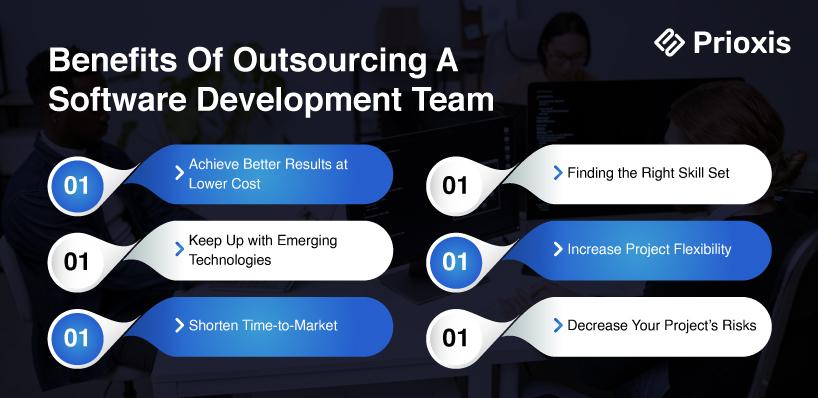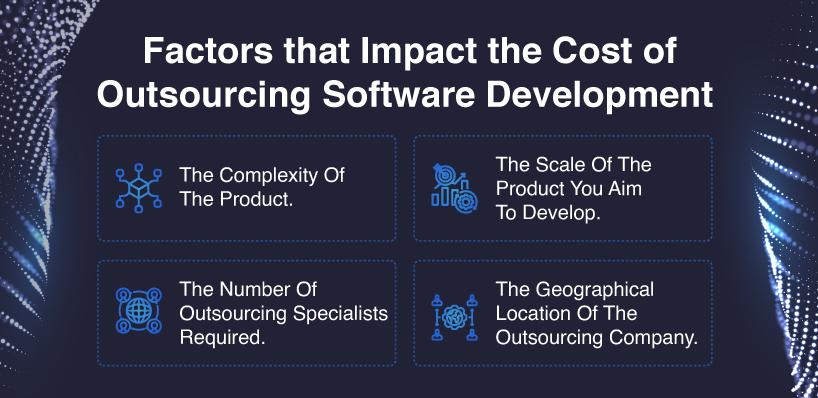Benefits of Software Development Outsourcing
 Admin
Admin Software Development
Software Development Aug 02, 2024
Aug 02, 2024

Table of Content
Outsourcing has become a common practice in business today, fueled by globalization and increasingly interconnected economies. Businesses globally collaborate with third-party software solutions providers to develop essential software solutions & to reduce the pressure on their in-house teams.
IT outsourcing revenue is going to hit US$591.24bn mark by 2025 and it is forecasted that it will reach US$812.71bn by 2029 because more and more organizations are adopting this approach.
You might be wondering why so many businesses are outsourcing their software development needs to third-party vendors in other countries. This blog will answer all your questions and explain the benefits of software development outsourcing, as well as how to find the right outsourcing partner.
What is software outsourcing?
Software outsourcing is the practice of partnering with external service providers to handle software development tasks and IT support, reducing the burden on in-house teams.
Outsourcing software development projects help companies lower software development costs, access global talent, and optimize business processes. It also allows organizations to focus on their core operations, as the software development process is managed by an external provider.
Advantages of Software Outsourcing
Business organizations often have reasons to outsource their work. Despite their reasons, their motives are almost the same: to tap into a wide range of benefits offered by outsourced software development services—benefits they might not have access to if the projects were handled in-house.
Here are the top benefits of outsourcing a software development team.

1. Higher Cost Efficiency
Although cost is no longer the sole motivation for outsourcing software development, it remains a significant benefit. Software developers’ average rates are much lower in Asia compared to software development in the USA, the UK, and Australia. As per Glassdoor, the average cost per hire in the UK and the USA is almost $4,000. Many companies choose to outsource software development tasks because of these cost advantages.
According to Deloitte’s 2022 outsourcing survey, 57% of executives' primary motivation for outsourcing is to reduce costs. Outsourcing software development saves you money on salaries, equipment, and office infrastructure. As you need not hire an in-house team.
Plus, the outsourced company takes care of some financial burdens, making it more cost-effective. If your company is from the USA or the UK, hiring an experienced team is expensive and competitive. Contracting with an offshore outsourced team can mitigate this, benefiting from lower hourly service rates.
For instance, India is one of the most cost-effective countries for software development outsourcing. Reducing costs frees up funds for other business areas, such as personnel, hardware and software upgrades, office expansions, and increased salaries.
2. Leverage Emerging Technologies
Digital transformation pushes organizations to adopt advanced software development technologies to stay competitive. The latest development frameworks, project management tools, and technologies always evolve, making it tough for in-house teams to keep up.
According to Gartner, the average cost of downtime for small to medium-sized businesses (SMBs) is approximately $137 per minute. This highlights the financial impact of relying on older technology.
Outsourcing gives you access to teams that are experts in the latest development technologies. You can gain a competitive edge using cloud computing, DevOps automation, artificial intelligence, and more. Thus, your company stays relevant and can meet your customers' ever-changing demands.
3. Less Time-to-market
Setting up an in-house development team can be time-consuming. In contrast, outsourcing allows you to engage a team of skilled developers and get your project off the ground without delays.
For example, at Prioxis, we start working on your project within 48 hours of onboarding.
A faster market entry provides more opportunities to grow your business, reduce product risks, and strengthen your brand's position in the marketplace. Additionally, working with offshore software developers allows you to take advantage of time zone differences. The time difference allows for continuous project progress, speeding up completion.
4. Finding the Right Skill Set
Due to domestic talent shortages in regions like the U.S., Western Europe, and Australia, outsourcing fills skill gaps without compromising quality. It also allows you to use fractional skill sets you don't need full-time. Outsourced software development connects businesses with top specialists globally.
Working with professionals on a project basis can lead to innovative solutions. Developers can bring fresh perspectives and identify opportunities to enhance the product, contributing to its success.
5. Increase Project Flexibility
A product development cycle can last longer than expected. It can also need more resources than you anticipate, or vice versa. Market trends, customer expectations, and project scope can affect the work process. When working on complex software projects with extensive requirements, you must have control over staffing decisions.
Outsourcing simplifies scaling. When projects call for extra expertise or resources, you can outsource the extra work to one or more vendors. This flexibility allows you to respond to changes efficiently.
You don't need to spend money on recruiting, hiring, training, and integrating new employees into the company culture. You only have to look for a software company with the necessary professionals. The company takes care of equipment and software. You interview the candidates and assign them to work on specific projects or products. It’s quicker, easier, and more cost-effective.
You can outsource extra work to one or more vendors when projects need extra expertise or resources. Thus, you can scale up staffing levels when workloads increase and scale down when projects are completed.
6. Decrease Your Project’s Risks
There is a built-in risk in developing and releasing new products, even if market research states a high likelihood of success. These risks can be particularly challenging for startups and SMEs exploring new directions without a proven formula for success.
Outsourcing software development to other companies can mitigate these risks. These companies already have a high-quality project management system, an established workflow, and experience creating successful applications.
For example, a healthcare company in Finland handed over the development of Kunto, a healthcare app, to Prioxis. By outsourcing the project, they created a healthcare app that uses smartphone data to track patient recovery.
We integrated electronic health records and data from Google Fit and Apple platforms, resulting in a comprehensive and intuitive app. By outsourcing, the company reduced risks, saved costs, and improved patient care.
How to Decide If Your Business Needs Outsourcing?
You might have heard that companies like Google, IBM, and Nestlé have been outsourcing and reaping numerous benefits. However, what works for these global giants may not necessarily work for your business. It’s important to make a decision only after carefully evaluating all aspects of your specific needs and goals.
Here’s how you can decide if outsourcing is right for your business:

Examine Your Goals
- What are you hoping to achieve?
- How important are cost savings, efficiency, and accessing specialized skills to your business?
Weigh the Pros and Cons
- Pros are lower costs, better efficiency, and access to a vast talent pool.
- Cons are communication issues and dependency on external teams.
Consider Your Requirements
- Outsourcing might be a good fit if you do not want to be involved in every step of the software development process. Hiring a dedicated development team is a great option, even if you want complete involvement.
Look for Specialized Talent
- Outsourcing can provide the skills you need if your project requires specific expertise.
Check out a detailed guide on how to hire a dedicated development team.
How to Find a Reliable Outsourcing Software Development Company?
These are a few points which you can consider before partnering with an outsourcing development provider.
- Check their technical expertise by reviewing their website and examining previous projects. See if they have experience with your preferred technologies, relevant industry domains, and the tech stack you require.
- Check out platforms like clutch, Design Rush, and Good Firms. The directories also highlight their services, client reviews, and industry rankings. These platforms are great for comparing many service providers at once. Reading recent reviews will also give you insights into the quality of their work and how satisfied their clients are.
- Discussing pricing, NDA and engagement models beforehand, fulfilling these steps will avoid you face any trouble in the middle of on-going projects. Discuss & read every point of the SRS document to avoid any confusion.
- Prioritize communication and collaboration. If your development partner can clearly understand all your requirements then consider your project half done. Perfect communication and clear understanding is key to success in outsourcing.
Conclusion
Outsourcing software development offers you the flexibility to adapt and thrive in a constantly changing environment. By examining your goals and weighing the pros and cons, you can determine if outsourcing is the right choice for your software development needs.
If your in-house team is struggling to build a software application, partnering with a dedicated software development outsourcing company is what you need.
Get in touch
